By susan m ford - Study guides, Class notes & Summaries
Looking for the best study guides, study notes and summaries about By susan m ford? On this page you'll find 348 study documents about By susan m ford.
Page 3 out of 348 results
Sort by
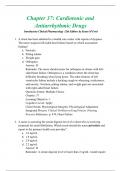
-
Chapter 37: Cardiotonic and Antiarrhythmic Drugs Introductory Clinical Pharmacology 12th Edition by Susan M Ford
- Exam (elaborations) • 16 pages • 2023
- Available in package deal
-
- $3.45
- 1x sold
- + learn more
Introductory Clinical Pharmacology 12th Edition by Susan M Ford 1. A client has been admitted to a health care center with reports of dyspnea. The nurse suspects left-sided heart failure based on which assessment finding? a. Nocturia b. Pitting edema c. Weight gain d. Orthopnea Answer: D Rationale: The nurse should assess for orthopnea in clients with left-sided heart failure. Orthopnea is a condition where the client has difficulty breathing when lying down. The other features of...
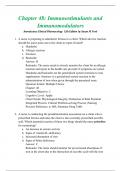
-
Chapter 48: Immunostimulants and Immunomodulators Introductory Clinical Pharmacology 12th Edition by Susan M Ford
- Exam (elaborations) • 18 pages • 2023
- Available in package deal
-
- $3.36
- 1x sold
- + learn more
Introductory Clinical Pharmacology 12th Edition by Susan M Ford 1. A nurse is preparing to administer ferrous to a client. Which adverse reaction should the nurse point out to the client to report if noted? a. Headache b. Allergic reaction c. Soreness d. Backache Answer: B Rationale: The nurse needs to closely monitor the client for an allergic reaction and report to the health care provider if symptoms are noted. Headache and backache are the generalized system reactions to iron ...
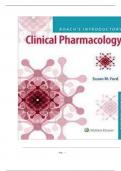
-
Test Bank - Roach’s Introductory Clinical Pharmacology 11th Edition by Susan M. Ford
- Exam (elaborations) • 621 pages • 2024
-
- $15.99
- 1x sold
- + learn more
Test Bank - Roach’s Introductory Clinical Pharmacology 11th Edition by Susan M. Ford Test Bank - Roach’s Introductory Clinical Pharmacology 11th Edition by Susan M. Ford Test Bank - Roach’s Introductory Clinical Pharmacology 11th Edition by Susan M. Ford Test Bank - Roach’s Introductory Clinical Pharmacology 11th Edition by Susan M. Ford
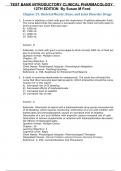
-
Chapter 29, Skeletal Muscle, Bone, and Joint Disorder Drugs TEST BANK INTRODUCTORY CLINICAL PHARMACOLOGY 12TH EDITION By Susan M Ford
- Exam (elaborations) • 15 pages • 2023
- Available in package deal
-
- $3.36
- 2x sold
- + learn more
TEST BANK INTRODUCTORY CLINICAL PHARMACOLOGY 12TH EDITION By Susan M Ford 1. A nurse is teaching a client with gout the importance of getting adequate fluids. The nurse determines the session is successful when the client correctly plans to drink at least how much fluid each day? A) 1000 mL B) 1500 mL C) 2000 mL D) 3000 mL Answer: D Rationale: A client with gout is encouraged to drink at least 3000 mL of fluid per day to promote uric acid excretion. Question format: Multiple Choice ...
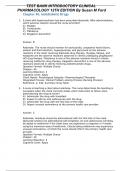
-
Chapter 40, Antidiabetic Drugs TEST BANK INTRODUCTORY CLINICAL PHARMACOLOGY 12TH EDITION By Susan M Ford
- Exam (elaborations) • 15 pages • 2024
- Available in package deal
-
- $3.70
- 1x sold
- + learn more
TEST BANK INTRODUCTORY CLINICAL PHARMACOLOGY 12TH EDITION By Susan M Ford 1. A client with hyperinsulinism has been prescribed diazoxide. After administration, which adverse reaction should the nurse prioritize? A) Myalgia B) Tachycardia C) Flatulence D) Epigastric discomfort Answer: B Rationale: The nurse should monitor for tachycardia, congestive heart failure, sodium and fluid retention, hyperglycemia, and glycosuria as the adverse reactions in the client receiving diazoxide drug...

-
Chapter 10, Antitubercular Drugs TEST BANK INTRODUCTORY CLINICAL PHARMACOLOGY 12TH EDITION By Susan M Ford
- Exam (elaborations) • 15 pages • 2023
- Available in package deal
-
- $3.47
- 1x sold
- + learn more
TEST BANK INTRODUCTORY CLINICAL PHARMACOLOGY 12TH EDITION By Susan M Ford 1. An HIV-positive client in a continuing phase of TB has shown no positive sputum results for 6 months. The nurse is aware that the second phase can last 4 months or more under which circumstances? A) Positive sputum culture after the completion of initial treatment B) Inclusion of pyrazinamide in the initial treatment C) Following the same eating habits in the continuing phase D) Nausea or vomiting after complet...
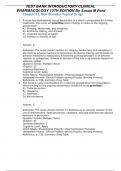
-
Chapter 52, Skin Disorder Topical Drugs|| TEST BANK INTRODUCTORY CLINICAL PHARMACOLOGY 12TH EDITION By Susan M Ford
- Exam (elaborations) • 15 pages • 2024
- Available in package deal
-
- $3.64
- 1x sold
- + learn more
1. A nurse has administered topical benzocaine to a client in preparation for a minor treatment. The nurse will prioritize which findings if noted on the ongoing assessment? A) Stinging, tenderness, and sloughing B) Erythema, flaking, and dryness C) Transient burning sensation D) Oiliness or dryness of hair Answer: A Rationale: The nurse should monitor for stinging, tenderness, and sloughing in the client as adverse reactions to benzocaine. Erythema, flaking, and dryness are adverse re...
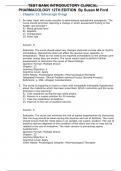
-
Chapter 23, Adrenergic Drugs TEST BANK INTRODUCTORY CLINICAL PHARMACOLOGY 12TH EDITION By Susan M Ford
- Exam (elaborations) • 14 pages • 2023
- Available in package deal
-
- $3.58
- 1x sold
- + learn more
TEST BANK INTRODUCTORY CLINICAL PHARMACOLOGY 12TH EDITION By Susan M Ford 1. An older client with acute sinusitis is administered epinephrine emergently. The nurse should prioritize reporting a change in which assessment finding to the health care provider? A) Blood glucose level B) Appetite C) Temperature D) Pulse rate Answer: D Rationale: The nurse should report any changes observed in pulse rate or rhythm immediately. Epinephrine does not affect the glucose level, appetite, or temp...
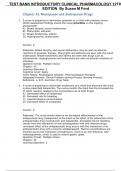
-
Chapter 45, Menopause and Andropause Drugs TEST BANK INTRODUCTORY CLINICAL PHARMACOLOGY 12TH EDITION By Susan M Ford
- Exam (elaborations) • 14 pages • 2024
- Available in package deal
-
- $3.04
- 2x sold
- + learn more
1. A nurse is preparing to administer goserelin to a client with prostate cancer. Which assessment findings should the nurse prioritize on the ongoing assessment? A) Breast atrophy, sexual dysfunction B) Pharyngitis, asthenia C) Breast tenderness, edema D) Hyperglycemia, leukocytosis Answer: A Rationale: Breast atrophy and sexual dysfunction may be seen as adverse reactions of goserelin therapy. Pharyngitis and asthenia are seen with the useof anastrozole. Breast tenderness and edema a...
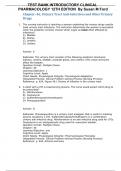
-
Chapter: 46, Urinary Tract Anti-Infectives and Other Urinary Drugs TEST BANK INTRODUCTORY CLINICAL PHARMACOLOGY 12TH EDITION By Susan M Ford
- Exam (elaborations) • 14 pages • 2024
- Available in package deal
-
- $2.99
- 2x sold
- + learn more
1. The nursing instructor is teaching a session explaining the various drugs usedto treat urinary tract infections. The instructor determines the session is successful when the students correctly choose which organ as most often affected by infections? A) Bladder B) Kidney C) Urethra D) Ureters Answer: A Rationale: The urinary tract consists of the following anatomic structures: kidneys, ureters, bladder, prostate gland, and urethra. UTIs most commonly affect the bladder. Question fo...

Did you know that on average a seller on Stuvia earns $82 per month selling study resources? Hmm, hint, hint. Discover all about earning on Stuvia


